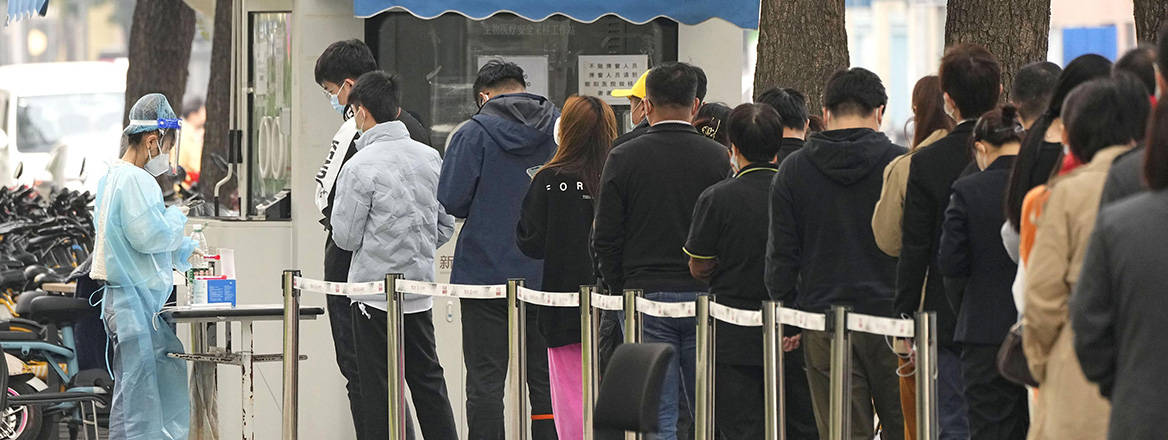The Insecurity of China’s Dynamic Zero-COVID Policy
Since the outbreak of the pandemic, China has pursued a markedly different approach to the West. But the costs of maintaining its current policy are steadily rising.
At last week’s 20th Party Congress in Beijing, Xi Jinping reaffirmed China’s policy of dynamic zero-COVID. Stringent, rapid action to contain each and every outbreak remains imperative. Xi’s bigger message, however, was the critical role of national security and social stability. For Xi, ‘social stability is a prerequisite for building a strong and prosperous China’. Yet recent COVID policy now stands in conflict. Several days earlier, a small but rare protest in Beijing had clamoured for change: ‘No more PCR tests, we want to eat. No more lockdowns, we want freedom’.
For the first 18 months of the pandemic, things were very different. China’s COVID policy protected lives and increased domestic support for the government. It enhanced security rather than undermining it. After initial obfuscation and hesitation, the Chinese leadership moved rapidly and forcefully. From late January 2020, Xi Jinping placed the full force of China’s party-state apparatus behind lockdowns, mandatory testing, border closures and controlling media messaging. China contained infections and deaths to levels dramatically lower than those in the West, even allowing for incomplete data.
But, as COVID-19 spread in Wuhan and hospitals became overwhelmed, it was not just human lives that were in need of protection. So too was the rule and legitimacy of the Communist Party of China. Failure to contain COVID-19 would have been a party failure and risked widespread discontent, even unrest. It might have undermined the very ability to maintain public order as millions became infected. Bruno Macaes, an author and commentator, has observed that, from the start, ‘China took Covid as a national security crisis; Europe and the US as a public health crisis’.
For Xi Jinping, national security is ‘comprehensive’. This is a broad concept indeed, comprising 16 different categories, including biosecurity – under which falls the risk of epidemics. Above all else, though, stands political security – the safeguarding of party rule. In Xi’s words, this is the ‘bedrock’. How could it be otherwise when Xi holds that only the party will bring about the ‘great rejuvenation’ of the Chinese people? Next in importance comes economic security, the ‘foundation’ for national security. Yet China’s economy is now at its weakest for decades. While China faces myriad economic challenges, the most immediate and direct is the impact on economic activity of rolling, uncertain lockdowns and frequent testing routines.
China’s path out of zero-COVID remains a risky one. With low vaccination rates among the elderly, the public health system could be quickly overwhelmed
From 2021, the world outside China pivoted from zero-COVID to ‘living with COVID’. As the more infectious Omicron variant spread, countries combined Western-developed vaccines with extensive vaccination programmes to pursue their own paths out of lockdown. Xi chose not to pivot. He also chose self-reliance: Western vaccines have not been approved for use in China.
The reasons are debatable. Across the broader economy, it is again security concerns that lie behind the quest for self-reliance. The call is to remove so-called ‘chokepoints’ of dependence on Western technologies. With COVID, perhaps the risk that vaccine supply might be weaponised by the US was too great to entertain. Relying on Western vaccines would also muddy the narrative that the party alone can protect the Chinese people. Or perhaps it was a simple but far-reaching miscalculation. And the greatest risk of all may now be to admit a policy mistake.
Taken alone, using the more effective Western vaccines would not solve China’s COVID dilemma. The government has not put the same energy behind vaccination as it has testing and lockdowns. Again, the reasons are unclear – be they concerns about even stronger public resistance to vaccine mandates than to lockdowns; a deep-seated lack of conviction about vaccine effectiveness; or simply the fact that it is easier to deploy large numbers of security personnel than medical staff.
China’s path out of zero-COVID remains a risky one. With low vaccination rates among the elderly, the public health system could be quickly overwhelmed. Spurred on by Chinese media messaging, many continue to fear COVID viscerally. But rolling lockdowns cannot go on forever. The costs and risks are steadily rising.
Those adaptations that are happening seem to be more demonstrations of performative commitment to zero-COVID than practical solutions
The single-minded focus on zero-COVID now represents a greater risk. At the Party Congress, Xi spoke of the need to ‘apply systems thinking’, stating that ‘all things are interconnected and interdependent’. But zero-COVID takes no account of untreated cancers, delayed medical treatments, or the mental health toll of lockdowns – let alone its economic and educational impact. Dogged commitment in the face of policy problems undermines rather than strengthens the party’s credibility. A more integrated approach would increase resilience and overall security.
Policymakers would be better advised to draw on another part of Xi’s Party Congress report. Xi reiterated the need to ‘adopt a problem-oriented approach’. China’s economy has long prospered through a messy mix of top-down guidance and bottom-up experimentation and adaptation to local conditions. China needs more experiments right now to find ways to exit zero-COVID with manageable public health consequences.
But the nature of experiments is that some fail. And failure appears riskier than ever in China today. Government officials need space to adapt and adjust ‘under the radar’. Those adaptations that are happening seem to be more demonstrations of performative commitment to zero-COVID than practical solutions: rocks and fish are given PCR tests and personnel spray disinfectant widely on open streets.
The messaging of any policy change need not be a problem. Zero-COVID can naturally be declared a success and itself adapt and evolve. In China, policy phrases have elastic meanings. The Belt and Road Initiative remains important, but its focus and interpretation keep changing. Xi has long spoken of seeking ‘harmony between man and nature’. Could this be ‘living with COVID’ by another name?
The views expressed in this Commentary are the author’s, and do not represent those of RUSI or any other institution.
Have an idea for a Commentary you’d like to write for us? Send a short pitch to commentaries@rusi.org and we’ll get back to you if it fits into our research interests. Full guidelines for contributors can be found here.
WRITTEN BY
Andrew Cainey
RUSI Senior Associate Fellow, International Security
- Jim McLeanMedia Relations Manager+44 (0)7917 373 069JimMc@rusi.org


